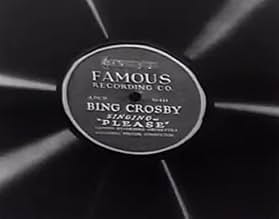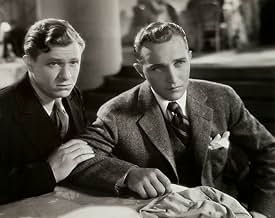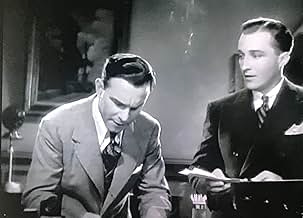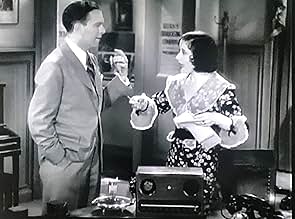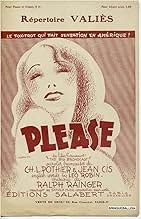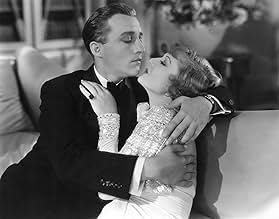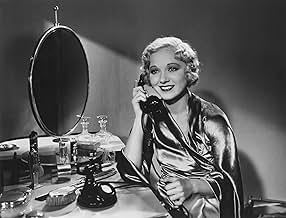Aggiungi una trama nella tua linguaA radio-singer, Bing Crosby, is none-too-concerned about his job, and an affair with Mona leads to his dismissal. When it appears Hornsby is getting and paying a lot of attention to his fian... Leggi tuttoA radio-singer, Bing Crosby, is none-too-concerned about his job, and an affair with Mona leads to his dismissal. When it appears Hornsby is getting and paying a lot of attention to his fiancée, Anita Rogers, station manager Leslie McWhinney buys the station, gives Hornsby his jo... Leggi tuttoA radio-singer, Bing Crosby, is none-too-concerned about his job, and an affair with Mona leads to his dismissal. When it appears Hornsby is getting and paying a lot of attention to his fiancée, Anita Rogers, station manager Leslie McWhinney buys the station, gives Hornsby his job back, and goes on a honeymoon with Anita.
- Regia
- Sceneggiatura
- Star
- Premi
- 1 vittoria in totale
- George
- (as Burns and Allen)
- Gracie
- (as Burns and Allen)
Recensioni in evidenza
I give you three choices: 1) Watch the whole movie, to experience the drama, along with the actual 'big broadcast'. 2) Watch only the film beginning with the 60min mar, to delete most of the drama. 3)watch the YouTube 'the Big Broadcast 1932 excepts': a 12 min. Extraction of what are considered the most entertaining musical numbers of the actual 'big broadcast'. The musical performances during the actual 'big broadcast' include the following: 1) the Mills Brothers sing "Tiger Rag" I don't know how the one manages to make a very good imitation of a musical instrument with just his hands together. 2)The Vincent Lopez orchestra does a rather amusing novelty number 3)Vincent Novis sings the inspirational song "Trees" (Only God can make a tree) 4) The 3 Boswell sisters sing the jazzy "Crazy People" 5 )Kate Smith sings an inspirational number 6 )Cab Calloway dances around while singing "Minnie the Moocher", backed up by his band. Lastly, Stuart tries to mimic Bing, who is late, in singing "Please". Eventually, Bing shows up, and sings the last part. You also get a brief look at the luscious Leila, if you haven't already,. Mona is also present, with an unexplained black eye(she was last seen in Bing's company).
If you aren't familiar with the 3 Boswell Sisters, they grew up in New Orleans during the birth of jazz there, which influenced much of their music. They were very popular on radio, as well as records from mid '20s to mid '30s, encompassing the late 'jazz Age' and early 'Swing Era'. The Andrew sisters took over their spot in the late '30s and 40s, during the height of the 'Swing Era' and WWII. Hence, they tend to be more remembered, although they learned much from the Boswell Sisters. The McGuire Sisters then largely replaced the Andrew Sisters in the'50s, I tend to remember the McGuire Sisters the least of these 3. There are several songs by the Boswell Sisters at YouTube, or you can buy one of the several CDs of their music currently available.
When the story begins, Bing is late for a radio broadcast and it's not all his fault. Like many famous crooners, he's attacked by adoring fans and barely makes it to the studio in one piece! But the sponsor is furious with Crosby and demands he be fired...and the station's owner (George Burns) complies. However, soon they regret it because Bing is such a big star.
In the meantime, Bing's life goes from bad to worse, as not only is he off the radio, but his girlfriend has just run of with another man! He soon meets Les (Stu Erwin) in a bar and he, too, has girl trouble...so they both decide to kill themselves! Wow...talk about a dark turn. Now all this happens in the first 10-15 minutes of the film...so rest assured...they'll be alright. What's next? See the movie and find out yourself.
While much of this film was an excuse to feature various radio acts (not just Crosby but Kate Smith, the Mills Brothers, Cab Calloway and a few others), it actually had more story than I expected from a movie like this. Overall, an interesting look at some wonderful musical acts and a decent story as well...made better by Erwin and his pleasant persona.
So what is so odd? The film opens with a loudly ticking clock as everything in the radio station acts in synchronization with the sound of the clock. The steps of a messenger boy as he goes down the hall, the steps of a black cat as he walks, Cab Calloway's baton, as everybody is waiting for a tardy Bing Crosby.
When the sponsor of the show appears and demands that Bing be fired for persistent lateness, the clock face grows astonished eyes and its hands move in horror. The cat freezes and slips under a door through a half inch crack. A radio microphone grows astonished eyes when a surprising announcement is made.
Who else runs the radio station but George Burns aided by his hare brained secretary, Gracie Allen. "A lot of people around here have been driving me crazy for years and I thought for once I'd hire somebody that would drive them crazy." - Burns' explanation of why he hired this secretary.
The really oddest scene in the entire film? An attempted suicide by Bing and his new pal Leslie McWhinney (Stuart Erwin). Both just dumped by their gals, they turn on the gas in Bing's apartment and wait for the end. They begin to hallucinate, seeing a skull and dancing skeletons. Very precode. That and Stuart Erwin trying to make up with Leila Hyams while she is in the shower and he is just outside the curtain wearing her lingerie. If you want an explanation of this watch the film.
Note that Stu Erwin is top billed over Crosby as Bing's career is just starting out. In fact, this was Bing's first feature film for Paramount, the studio that would become his home. Erwin acquits himself well, including a long mute comic bit towards the end that he handles deftly.
The real reason to watch this besides the weird humor and the macabre and precode moments are the musical acts - Kate Smith, Cab Calloway and his orchestra, the Mills Brothers, and the Boswell Sisters. And Bing Crosby singing "Please" should please just about anyone.
Watch it for the comical and musical oddity that it is. I wish that somebody would clean it up and put it on physical media.
The slight plot revolves around Bing Crosby (Bing Crosby), the most popular singer at WADX Radio Station in New York City. Due to his constant lateness, Mr. Clapsaddle (George Barbier), the upset sponsor, forces radio manager, George Burns (George N. Burns) to have Crosby fired. Anita Rodgers (Leila Hyams), Burns' secretary, silently loves Bing, though he fails to notice her. Bing is engaged to marry dancer, Mona Lowe (Sharon Lynn), the one responsible for his irresponsible behavior. While celebrating his final days as a bachelor with his friends at a speakeasy, Bing sees a newspaper article of Mona eloping with a broker and jilting Crosby. After befriending an equally depressed Leslie McWhinney (Stuart Erwin), a Texas oil man jilted by the girl he loves and being taken for $100,000 by a gold-digging widow, Bing invites the poor soul to his apartment where he plans a double suicide. Bing's plot fails with the arrival of Anita, Leslie's girlfriend from back home, with the news of Mr. Burns agreeing to give Bing his job back now that he's no longer engaged to be married. As Bing arranges to find Leslie a job at the studio, warrant officers turn up to close down the station. With his remaining $900,000, Leslie buys the radio station and becomes its president. All goes well until Mona Lowe returns to Bing life again, making him irresponsible once more. Here lies love.
With old and new tunes (by Leo Robin and Ralph Rainger) combined for THE BIG BROADCAST, the musical program features that of "Dinah" (sung by Bing Crosby); "Speakeasy" (sung by telephone operators, Major, Sharp and Minor); "Here Lies Love" (sung by Arthur Tracy); "Here Lies Love" (reprised by Crosby); "Please" (Crosby); "Tiger Rag" (sung by the Four Mills Brothers); "Please" (reprise by Crosby); "I'm the Drummer" (sung by Vincent Lopez); "Trees" (sung by Donald Novis); "Crazy People" (sung by The Boswell Sisters); "It Was So Beautiful" (sung by Kate Smith); "Kicking the Gong Around" (sung by Cab Calloway); and "Please" (finale). At one point in history, a motion picture soundtrack of THE BIG BROADCAST was available through Sandy Hook records in the 1980s, but the movie itself thus far has never been distributed to home video.
The comedy team of George Burns (radio manager) and Gracie Allen (the receptionist) incorporate their vaudeville routines as part of the plot on two separate occasions rather than during the on-screen radio broadcast. The movie also acquires the brief glimpses of actual radio announcers (James Wallington, Donald Ball, William Brenton and Norman Brokenshire) introducing the upcoming acts. Paramount pulls no stops on broad comedy, whether cartoonish, the use of high speed projection, laughing toy horses or even allowing material reminiscent to those silent comedy era through situations enacted through radio theme music but no inter-titles as the hapless Leslie tries in vain to acquire a Bing Crosby record and prevent himself from either losing or damaging it.
Commonly presented on broadcast television in the 1970s and public television a decade later, the only known cable TV showing in latter years for THE BIG BROADCAST happened to be from American Movie Classics (1990-91). Due to its enormous popularity and career launching of Bing Crosby, Paramount repeated its success with follow-up sequels in name only: THE BIG BROADCAST OF 1936 (1935), 1937 (1936) and 1938 (1938), with the 1938 edition being notable for the feature film introduction of Bob Hope, Crosby's on-screen partner in seven installments to "The Road to" comedy series from 1940-1962. Regardless of surreal plot and situations, THE BIG BROADCAST is nostalgic in its own little way, and should still be of entertaining value even today. One final note: Why do many references refer to Crosby's role as Bing Hornsby? He's addressed and billed as Bing Crosby throughout the entire story. And now, The Big Broadcast. (**1/2)
Lo sapevi?
- QuizBing Crosby's song "Please" became the inspiration for John Lennon to write the Beatles' first hit "Please, Please Me"
- Citazioni
Anita Rogers: I love somebody else.
Leslie McWhinney: Whoever he is, he's a fool if he can't see you.
Anita Rogers: [after a long pause] It's Bing.
Leslie McWhinney: Bing?
- Curiosità sui creditiFilm opens with loudspeakers, then segues to lobby cards depicting several of the featured stars "Live".
- ConnessioniEdited into The Great Radio Comedians (1972)
- Colonne sonoreMinnie the Moocher
Written by Clarence Gaskill, Cab Calloway and Irving Mills
Performed by Cab Calloway
I più visti
Dettagli
- Data di uscita
- Paese di origine
- Lingua
- Celebre anche come
- The Crooners
- Luoghi delle riprese
- Azienda produttrice
- Vedi altri crediti dell’azienda su IMDbPro
- Tempo di esecuzione1 ora 28 minuti
- Colore
- Proporzioni
- 1.37 : 1

